Books for Jewish Children (Page 1) |
If you wish to purchase any of these books, click on either the title or the book cover to be directed to Amazon.com. As a warning, I have put up pictures of the book covers to give you somewhat an idea of the style of each book (I know, I know. "Don't judge a book by its cover") so the pages may load slowly, depending on the speed of your internet connection.
If this page came up without frames, Click here to see the complete "Books for Jewish Children" website
For more Jewish stories for children, go to the Jewish Folktales
and Talmudic Stories Page.
Other Pages of Interest:
Easy Reader and Picture Books:
General Jewish Children's Books
(Page 1)
(Page 2)
(Page 3)
(Page 4)
(Page 5)
|
Jewish Board Books |
Biblical Stories for Children |
Jewish Holiday Books |
Jewish Family Cookbooks |
Folktales and Talmudic Stories for Children |
Jewish Life Books (Mitzvot, Keeping Kosher, etc.) |
Jewish Life Cycle Books |
Family Haggadahs |
Children's Prayerbooks |
Introductory Hebrew Books |
Jewish History and Historical Fiction Picture Books |
Israel Books
Middle School and YA Books:
Bar Mitzvah Books |
Jewish Fiction |
Historical Fiction |
Torah Study |
Prayer and Jewish Life Books |
Jewish Holidays |
Jewish Biographies |
Jewish History Books |
Holocaust Books for Teens |
Israel Books
And More ...
Jewish Books for Children |
Bar Mitzvah Books |
Jewish Parenting Books |
Hanukkah Books |
Jewish Music for Children |
Jewish Videos |
Jewish Toys and Gifts |
Jewish Gift Baskets and Gourmet Food |
Jewish Jewelry |
Amazon.com Coupons, Promotions, and Sales
For more Jewish stories for children, go to the Jewish Folktales and Talmudic Stories Page.
Other Pages of Interest:
Easy Reader and Picture Books:
General Jewish Children's Books
(Page 1)
(Page 2)
(Page 3)
(Page 4)
(Page 5)
|
Jewish Board Books |
Biblical Stories for Children |
Jewish Holiday Books |
Jewish Family Cookbooks |
Folktales and Talmudic Stories for Children |
Jewish Life Books (Mitzvot, Keeping Kosher, etc.) |
Jewish Life Cycle Books |
Family Haggadahs |
Children's Prayerbooks |
Introductory Hebrew Books |
Jewish History and Historical Fiction Picture Books |
Israel Books
Middle School and YA Books:
Bar Mitzvah Books |
Jewish Fiction |
Historical Fiction |
Torah Study |
Prayer and Jewish Life Books |
Jewish Holidays |
Jewish Biographies |
Jewish History Books |
Holocaust Books for Teens |
Israel Books
And More ...
Jewish Books for Children |
Bar Mitzvah Books |
Jewish Parenting Books |
Hanukkah Books |
Jewish Music for Children |
Jewish Videos |
Jewish Toys and Gifts |
Jewish Gift Baskets and Gourmet Food |
Jewish Jewelry |
Amazon.com Coupons, Promotions, and Sales
General Jewish Children's Books (Page 1) (Page 2) (Page 3) (Page 4) (Page 5) | Jewish Board Books | Biblical Stories for Children | Jewish Holiday Books | Jewish Family Cookbooks | Folktales and Talmudic Stories for Children | Jewish Life Books (Mitzvot, Keeping Kosher, etc.) | Jewish Life Cycle Books | Family Haggadahs | Children's Prayerbooks | Introductory Hebrew Books | Jewish History and Historical Fiction Picture Books | Israel Books
Middle School and YA Books:
Bar Mitzvah Books | Jewish Fiction | Historical Fiction | Torah Study | Prayer and Jewish Life Books | Jewish Holidays | Jewish Biographies | Jewish History Books | Holocaust Books for Teens | Israel Books
And More ...
Jewish Books for Children | Bar Mitzvah Books | Jewish Parenting Books | Hanukkah Books | Jewish Music for Children | Jewish Videos | Jewish Toys and Gifts | Jewish Gift Baskets and Gourmet Food | Jewish Jewelry | Amazon.com Coupons, Promotions, and Sales
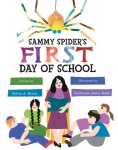 Sammy Spider's First Day of School By Sylvia A. Rouss and Katherine Janus Kahn |
It’s Sammy’s lucky day when he hitches a ride to preschool in Josh’s backpack! The children are learning the Jewish principle of kindness to animals, but what will happen when they discover a scary spider in the classroom? Every child will identify with this peek into a busy preschool day.
|
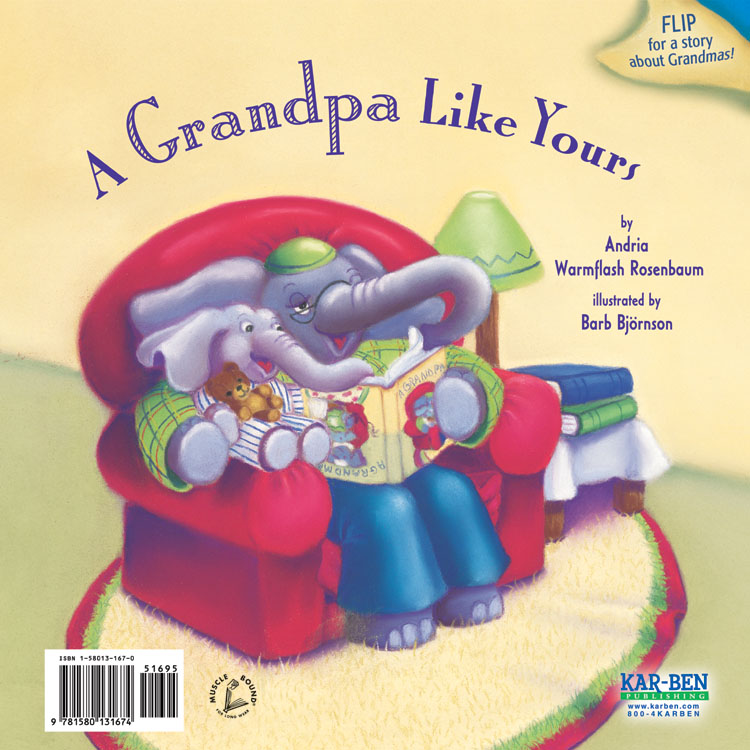 A Grandma Like Yours/ A Grandpa Like Yours By Andria Warmflash Rosenbaum |
Young childeren will recognize their own grandparents in this charming flip book where the traits of Jewish grandmothers and grandfathers are portrayed through whimsical animal illustrations and rhymes. Read about grandmas, bubbes and saftas from the front of the book and then flip it over to read about grandpas, zaydes and sabas from the other side.
This delightful picture book features two stories in one. The stories open up with "A zayde, a saba / No two are the same / Each Grandpa is special / Whatever his name" or "A bubbe, a Savta / No two are the same / Each Grandma is special / Whatever his name" Both stories show animal grandparents celebrating Jewish holidays and generally sharing time with their grandchildren. Throughout the story, different names for grandparents are used with each animal. Children will love the whimsical rhymes and the cheery illustrations. This is a superb choice for grandparents and grandchildren to share together. |
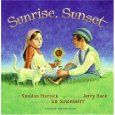 Sunrise, Sunset By Sheldon Harnick, Jerry Bock, and Ian Schoenherr |
Schoenherr's stunning artwork done in colored pencil, ink, and acrylic beautifully illustrates this song from Fiddler on the Roof. Jewish life in the shtetls of Eastern Europe is portrayed through the story of Tzeitel, Tevye's oldest daughter, as she grows up, falls in love, marries the tailor, and has a child of her own. The lyrics appear in large font on each page and the musical score is appended. However, with no introduction, background note, or explanatory text, only readers well-versed in the plot of the musical and familiar with the song will understand, appreciate, and enjoy this magnificently illustrated book.
This delightful picture book adaptation of the beloved song, "Sunrise, Sunset" from the famous musical Fiddler on the Roof, would be a wonderful gift item for any wedding, birth, Bar Mitzvah or graduation. For those who have trouble keeping a dry eye when this song is played at weddings, good luck getting through this book! While the reader is transported to a small Jewish village of old through gorgeous, golden-tinged illustrations, the song's lyrics dance across the page, begging to be sung with a wistful smile. Ian Schoenherr's vibrant illustrations follow a young girl's journey through life as she matures, falls in love with a childhood friend, gets married and, by the last page, has her own child. The characters look a lot like the actors from the movie version, including the skinny horse and village rooftops, but one doesn't have to know the story of Tzeitel and Motel to enjoy this tribute to the Jewish cycle of life. One particularly clever theme is the use of bright yellow sunflowers ("seedlings turn overnight to sunflow'rs") that follow the children as they grow and mature. The final double page spread celebrates the joys of a loving family when the young couple observes their baby's first steps as he reaches to embrace a golden sunflower held out before him. This book would be understood by children, of course, but the adults are the ones who will be moved by its meaning. Intended for ages 6 - 8 and appropriate for all ages. |
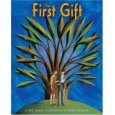 The First Gift By A. S. Gadot |
Little David tells about the first gift he ever got- his name! He introduces the concept of names and where they come from and gives facts about Jewish naming traditions, all in a picture book format.
This bright picturebook explains to children how we can have many different names and how important those names are. It begins with the tale of a young boy from Biblical times named David who was called "Son" by his father, "Useless" by his brothers, "Genius" by his harp teacher, "Your Majesty" by his subjects, and eventually "Daddy" by his son Solomon. From this auspicious beginning, Gadot relates names to the story of Creation and explains that children from different cultures can have different names, but everyone's name is a personal, special gift. In a parallel with the opening, the narrator ends the story by telling how he was named after his great-grandfather David and all the different names he is called ("Dave-Dave", "Dah-veed") and all the names he could possibly be called in the future ("Doctor", "Rabbi", "Mister President", or simply "Daddy"). The illustrations are bright and realistic yet simple enough to draw in younger readers as well. |
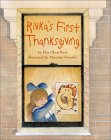 Rivka's First Thanksgiving By Elsa Okon Rael |
More than anything, Rivka wants to celebrate Thanksgiving. She has learned all about
the holiday in school and knows her family has a lot to be thankful for in America.
But Rivka's parents are Jewish immigrants from Poland, and they wonder what Pilgrims
and Indians have to do with them. Is Thanksgiving really a holiday for Jews?
Rivka's grandmother, Bubbeh, decides to take over: She will bring Rivka to see the Rabbi Yoshe Preminger -- and whatever the Rabbi concludes, Rivka will have to live with. Rivka knows that Thanksgiving is a holiday for all Americans, from all backgrounds and religions. But how can she convince the esteemed Rabbi Preminger? Elsa Okon Rael and Maryann Kovalski bring the bustling Lower East Side to life in this heartwarming story. Set in the 1910s, Rivka's First Thanksgiving is about respecting old traditions while embracing new ones, about giving thanks and celebrating freedom in America. Perhaps most important, Rivka's story teaches us that even the wisest adults have something to learn from children. This paean to the wisdom of children is based on Rael's (What Zeesie Saw on Delancey Street) own memories as a child of Jewish immigrants growing up on Manhattan's Lower East Side and will remind many readers of Barbara Cohen's Molly's Pilgrim. Like Cohen's tale, Rivka Rubin's story is set in early 20th-century New York City. In Rael's treatment, however, it is the child who understands intuitively that Thanksgiving is indeed a holiday for all Americans and thus may rightfully be embraced by recently arrived Jews, for they have much to be grateful for in having arrived in the US. It's not so easy to convince the adults around her, though, unfamiliar as they are with this American tradition. The neighborhood's revered rabbi initially decides that Thanksgiving is not a celebration for Jews, and that's enough to settle the matter for Rivka's family. Determinedly and with a show of the special brand of chutzpah given only to children, Rivka writes the rabbi a letter that begins: "My Bubbeh believes you are the wisest man in the whole world, but I cannot agree with her." The rabbi ultimately gives his blessing to Rivka's argument and is invited to sit at the head of the table at the Rubin family's first Thanksgiving celebration in America. Kovalski's (Jingle Bells, etc.) charming drawings, rendered in colored pencils and acrylics, burst with good cheer and beautifully depict the bustling streets of the Lower East Side and its close-knit families. Rivka's First Thanksgiving tells the story of an immigrant girl's attempt to balance her Jewish life with the American lifestyle she wishes to assimilate with. Rivka's parents immigrated to New York from Russia, where they were subjected to the horrible pogroms. Rivka attends public school and learns all about an American holiday called "Thanksgiving". She draws pictures of turkey and is immediately attracted to the holiday that allows Americans to be thankful for being in the United States. Rivka's mother and bubbe (grandmother), however, are concerned that Thanksgiving is a holiday that should not be celebrated by Jews. Rivka's bubbe brings her to the local Rabbi, who concludes that Thanksgiving is indeed a holiday that Jews should not celebrate. Rivka's response to her Rabbi's decision and its subsequent effect ultimately causes the Rabbi to reverse his decision and spend Thanksgiving with Rivka and her family. The colored pencil drawings add authenticity to the turn-of-the-century story. Children will relate to Rivka's charm and chutzpah. An excellent springboard to a discussion on what children have to be thankful for. |
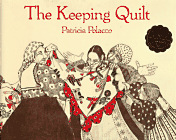
The Keeping Quilt By Patricia Polacco |
"We will make a quilt to help us always remember home," Anna's mother said. "It will be like having the family in backhome Russia dance around us at night." And so it was. From a basket of old clothes, Anna's babushka, Uncle Vladimir's shirt, Aunt Havalah's nightdress and an apron of Aunt Natasha's become The Keeping Quilt, passed along from mother to daughter for almost a century. For four generations the quilt is a Sabbath tablecloth, a wedding canopy, and a blanket that welcomes babies warmly into the world. In strongly moving pictures that are as heartwarming as they are real, Patricia Polacco tells the story of her own family, and the quilt that remains a symbol of their enduring love and faith. When Polacco's family emigrated from Russia they brought very little with them. The clothes on their backs and those of the other relatives were the real reminders of home. As they were outgrown and outworn, the clothes were cut up and made into a quilt. Patricia and her grandmother would recite the names of the relatives who owned a particular shirt, dress, or babushka pieced into the quilt. Over the years the treasured quilt was used to swaddle new members of the family, as a wedding chuppa, as a holiday tablecloth, and even at the ceremonies for the dead. The Keeping Quilt chronicles this family souvenir. Winner of The (Sydney Taylor Award (Association of Jewish Libraries) |
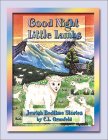 Good Night Little Lambs: Jewish Bedtime Stories By C. L. Grunfeld |
This collection of bedtime stories will delight your children with
stories from Tanach and Midrashic sources, accompanied by enchanting
illustrations.
In a playful twist, each story is related by a mother animal, of the type involved in that story, to her babies. For example, a mother spider tells her babies about how King David was once saved by the efforts of a spider who spun a web and concealed his hiding place. A joy to read for both parents and children! Great for children three to nine! |
 Mannys a Thief By Getzel |
A charming book that puts a new twist on the old game of "telephone,"
and brings home the damage that can be done by spreading a rumor.
This delightful story demonstrates how harmful a rumor can be in a way that children can easily understand. When Mrs. Golden hears "Manny's a Thief" through the door of apartment 31-C, she can't figure out which Manny it could be. Mrs. Overlander knows of only one possibility: Manny, the fix-it man. Soon the entire building is talking about how awful Manny the Fix-It Man is. It takes young David to solve the mystery of the original message and to teach everyone an important lesson on why they should not gossip. The hilarious story will be sure to enthrall preschoolers and elementary school children. |
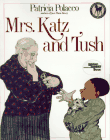
Mrs. Katz and Tush (Reading Rainbow Book) By Patricia Polacco |
Jane Addams Book Award winner Larnel gets to know newly widowed Mrs. Katz when he goes along with his mother to pay a comforting visit; next day, he goes back with a tailless kitten ("Tush'') that she agrees to accept "if you'll come and help me with her.'' So begins a touching friendship between the lonely old immigrant and the young African-American. ``Such a person,'' Mrs. Katz calls him - - her highest praise; they exchange feelings about being excluded from some places, and when he volunteers to share Passover (her first without Mr. Katz) she explains that it's a celebration of freedom: "Like your people, my people were slaves.'' Tush has kittens--"at last I am a bubee!'' Much later, Larnel's babies also think of Mrs. Katz as their grandmother: on the last page, there is a kaddish and a headstone inscription: "Mrs. Katz, Our Bubee...Such a Person.'' A book full of vibrantly idiosyncratic details; in the energetic illustrations, Polacco combines decorative patterns and lively action with her usual panache. Truly affectionate and heartwarming. Patricia Polacco knows her way around real grandmothers. . . . In white-bread America, where kids can't just run down to the local McDonald's and find babushkas who make gefilte fish, they are precious rare. Which is what makes Ms. Polacco's books so much fun. . . . Ms. Polacco tells her moral tales of intergenerational social tolerance with great zest and fun, even if she sometimes pushes a little as she strives to teach as well as entertain. Still, when Larnel learns what a seder is, children who are reading the book who have never heard of a seder will learn too. And what a seder it is. Mrs. Katz is a good bubee, and she makes it a real celebration. Ms. Polacco's illustrations -- in watercolor, pencil and collage, often mixing exuberant patterns--are winning,and her lively characters are bright and expressive. . . . But most of all, the grandmothers stand out; Ms. Polacco has put a lot of hugs into these vivid old ladies. |
 Molly's Pilgrim By Barbara Cohen 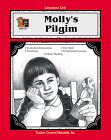 Teacher's Guide Also Available |
Molly and her parents are a Jewish family who have emigrated from Russia to the United States to escape religious persecution. Told to make a Pilgrim doll for the Thanksgiving display at school, Molly is embarassed when her mother tries to help her out by creating a doll dressed as she herself was dressed before leaving Russia to seek religious freedom. This special doll teaches Molly's classmates that there are all kinds of pilgrims. |
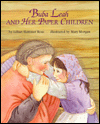 Buba Leah and Her Paper Children By Lillian Hammer Ross |
With its Fiddler on the Roof setting and unabashedly
sentimental story line, this warmly evocative tale presents
a glimpse of the Jewish immigrant experience. Chava is
curious about her next-door neighbor and great-aunt,
Buba Leah. She's often heard her say how she exchanged
her offspring for "paper children.'' When Chava finally
musters her courage to ask about them, she finds they
aren't actual children, but the letters written to Buba Leah
by her children in America. One day a letter arrives containing
two tickets--one for Buba Leah and one for Chava--and,
in a poignant finale, the two depart for a new life. Chava's
parents are left with Buba Leah's empty wooden box,
which they will soon fill with their own "paper children.''
Ross's simple story is as satisfying as Sabbath challah,
and Morgan's earthy illustrations render village life and
the special bonds between family members in an
affectionate light.
|
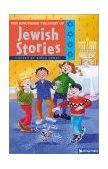 The Kingfisher Treasury of Jewish Stories By Jane Cope |
Ranging from folktales to contemporary stories, this anthology celebrates the richness of the Jewish heritage. The stellar list of contributors includes Isaac Bashevis Singer, Lynn Reid Banks, and Michael Rosen.
|
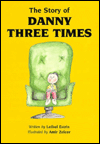 The Story of Danny Three Times By Leibel Estrin |
Did you ever hear of a boy named Danny Three Times? His parents had to
say everything to him three times or he just did not listen. Join
Danny and his parents on their humorous quest to solve their problem!
|
 Me and My Buddy My Ziedy and Me By Yaffa Ganz |
One set of children lovingly tell about all the meaningful
and special things their two sets of grandparents do, especially
around holiday time.
|
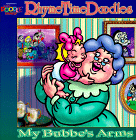 My Bubbe's Arms (Rhymetime Doodles) By Reudor |
The love between Bitsy and her grandmother, Bubbe, is recounted
through the heartfelt observations of the child. The delightful verse,
laced with humor and warmth and the captivating paintings, are designed
to grasp the imagination of the young reader, and stir their own
emotions and vision of personal relationships.
|
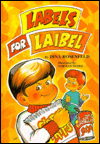 Labels for Laibel By Dina Rosenfeld |
Laibel doesn't like to share with his little brother, so he devises a clever plan to put an end to it. But someone soon outsmarts Laibel, helping him to discover why sharing is more important than he thought. Adroitly written in catchy rhyme, with vivid illustrations. |
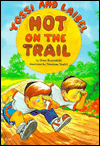 Yossi and Laibel Hot on the Trail By Dina Rosenfeld |
The lovable characters from Labels for Laibel are back in an all new rhyming adventure. Join the two brothers as they follow a trail of good deeds, going out of their way to help every Jew - no matter what and no matter who! |
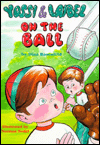 By Dina Rosenfeld Yossi and Laibel on the Ball |
These brothers have a following, having been introduced to
readers in three precious books. Told in the author's signature
rhyme, and illustrated in bright colors and semi-cartoon style,
the brothers' dilemma this time is whether or not to allow
their new wheel chair-bound neighbor, a boy their age, to
play baseball with them-and ultimately to play on their
baseball team. Fortunately, the boy turns out to be a whiz of
a pitcher and pitches the team to victory.
|
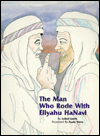 The Man Who Rode with Eliyahu Hanavi By Leibel Estrin |
Like most of us, Rabbi Yehoshua Ben Levi wonders why good things happen to bad
people, and why bad things happen to those who are good. One night he is given the
opportunity to find out, as he joins Eliyahu HaNavi on his travels. Through delicate
watercolor paintings and thoughtful dialogue, the young reader learns even if it sometimes
appears otherwise everything Hashem does is always for the best.
|
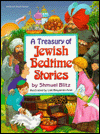 A Treasury of Jewish Bedtime Stories By Shmuel Blitz |
These twenty-one stories cover the gamut from gentle humor to
profound faith to warm kindness. The heroes range from kings
and sages to wise travelers and fantasizing laborers. This is one
of those rare books that youngsters will curl up with again and again.
This is a parent's answer to "one more story please..."! A Treasury of Jewish Bedtime Stories contains 21 stories, each only 2 pages long (including at least one large illustration). The stories involve witty characters (or silly Chelmites) dealing with problems in a way that is sure to delight young childre. A glossary is included. An excellent choice for reading aloud! |
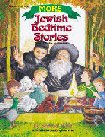 More Jewish Bedtime Stories: Tales of Rabbis and Leaders By Shmuel Blitz |
Mommy, more stories -- please!” Many a mother (and father) has heard this plea from children who have listened to A Treasury of Jewish Bedtime Stories over and over again. There is no shortage of storytellers, but few have mastered the craft as well as Shmuel Blitz and his great illustrator Liat Binyamini Ariel. So when their bestselling Treasury evoked calls for more, they went back to their writing table and easel -- and this new book is the happy result.
This book is filled with stories of great Jews, in their youth and maturity; charming, inspiring, enjoyable stories; stories that are models of behavior; stories that show precocity; stories that show compassion; and stories that give parents springboards for loving messages about present behavior and future goals. Your children will want to hear these stories and enjoy the illustrations over and over again. And they’ll be able to, because the book has a sturdy, child-resistant binding. When your little ones clutch this book as they fall asleep, they’ll have the stuff of good dreams in their precious minds. This new volume of bedtime stories concentrates on stories of great geonim and tzaddikim. Your children will love to hear about the best night the Steipler ever had, the Sanzer Rav's missing gold cup, and Rabbi Akiva Eiger's empty coach. Sound fascinating? They are. And so are all the other stories in this wonderful childrens book. Illustrated by Liat Benyamini Ariel. |
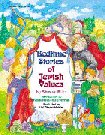 Bedtime Stories of Jewish Values By Shmuel Blitz |
Honesty, loyalty, piety, generosity, faith -- there is a long list of virtues that parents and teachers long to inculcate in their children. Textbooks cannot do it. Preaching often fails. Example is hard to find.
Stories are often the best tool. What can be more enjoyable than a good story, and what can be more effective than such a story with a moral subtly woven within it? Such are the stories in this new offering from the pen of Shmuel Blitz, illustrated by the brush of Liat Binyamini Ariel, whose collaboration began with the best-selling Treasury of Jewish Bedtime Stories. In this new, beautifully illustrated collection, Blitz tells many stories with a message. Some are familiar. Some are original. All are adapted for a child’s interest. The reader may note that many of the stories originate in Talmudic and Midrashic literature. Others are familiar from generations ago. Here they are crafted to grab a child’s wide-eyed attention and keep him or her asking to hear them and feast on their illustrations again and again. The sturdy, child-resistant binding guarantees many days and nights of enjoyable, beneficial use. Put this book with your child’s favorites, and watch the virtues flow. |
 Ten Classic Jewish Children's Stories By Peninnah Schram |
These classic tales of Miriam, Aaron, Abraham and others,
reveal the traits that made them heroes of the Jewish people and the world .
|
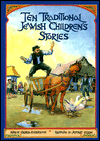 Ten Traditional Jewish Children's Stories By Gloria Goldreich |
Goldreich has created a wonderful bedtime book. The pictures are magnificent,
showing all the joys of life in the Shtetl, while not totally glossing over the fact
that shtetl life was often difficult, dirty, and poor. The story "Don't Make Me
Do What My Father Did" is laugh-aloud funny-what could his father have
done when no one would give him food? And "Half Price to Letchev" teaches
us that a bargain is often worth even less than what you paid for it. The pictures
are fabulous. A garden is so real that the vegetables and flowers just beg to be
picked.
|
 Ten Best Jewish Children's Stories By Chana Sperber and Rabbi Daniel Sperber |
A collection of traditional stories, with thought-provoking questions after each
one. Selections include the familiar "How Could It Be Worse?," "For the Love
of Two Brothers," "Nicanor's Golden Doors," and "Yosef's Love for the Sabbath."
Less familiar are "God's Hidden Ways" (sometimes misfortune saves one from a
tragedy), "More Valuable Than Gold" (the value of honoring one's father),
"The Scorpion and the Wedding" (an act of kindness and charity saves a sage's
bride from being bitten by a sorcerer's scorpion), and "The Shadow on the
House of Study" (it is permissible to do ordinarily forbidden activities on the
Sabbath to save a life). There is one treasure here-"The Chickens That Turned
into Goats." Never mind what it teaches-it is perfect on its own. The stories are
simply told and stripped to their oral-storytelling essentials. The artist draws
great goats and wonderfully expressive human faces and hands in a dramatic,
naturalistic style.
|
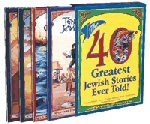 The 40 Greatest Jewish Stories Ever Told! By Barbara Goldin, Peninnah Schram, Gloria Goldreich, and Rabbi Daniel and Chana Sperber |
Includes:
The first collection of stories by professional Jewish storytellers. Each author has written a number of books and has a dedicated following. The individual volumes sell for $16.95 each, which means that the end purchaser gets one book free in the slipcase. The four volumes in the slipcase are each illustrated in color. There has been significant editing of the volumes in the sipcase which make the stories even more readable. |
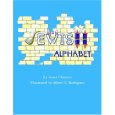 Jewish Alphabet By Janet Clement |
Jam-packed with informative and fun facts, this ABC book teaches Jewish culture and tradition with alliteration and rhyme. In "I is for Israel," young readers learn which language is acknowledged nationally, which city is recognized as the capital, and what three major religions are rooted and represented in that country. "B is for bagels" describes the popular food’s variety as well as what is traditionally eaten with them.
The entire alphabet is displayed at the top of all twenty-six entries, with the highlighted letter represented in bold typeface. Below the linear alphabet, the highlighted letter is stylistically drawn to represent the letter as well as depict the chosen word. The selected word is used and defined, and additional words beginning with the same letter are introduced. |
Page 1 | Page 2 | Page 3 | Page 4 | Page 5
Still can't find what you're looking for? Search Amazon.com's database directly.
©1999-2006
(NOTE: The following links have NOT been placed on the site by the website owners. We have no control over which ads are selected and are not responsible for their religious content.)
Still can't find what you're looking for? Search Amazon.com's database directly.